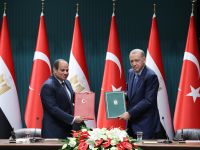Tunisia’s Elections: Polarization, Coalitions, and the Need for Pluralism
Tunisia is often cited as an example of successful government formation in the aftermath of the Arab Spring. The Islamist Ennahda Party, Tunisia’s most important political party after the fall of Ben Ali from power, could have easily taken a more iron-fisted approach to social unrest and economic crises that swept across the country in the past several years. However, it willingly stepped back when leftist party Nidaa Tounis won parliamentary and presidential elections in late 2014. Today’s coalition government between Ennahda and Nidaa Tounis, as well as other parties, represents a political pluralism that is vital if Tunisia is to develop into the robust democracy it has the potential to become.
Source: Muftah
Egypt’s Democratic Delusion
Egypt’s newest round of parliamentary elections, set to take place from March to April of this year, represent the next step in defining post-revolutionary Egypt’s new role on the international stage. However, despite seat quotas for youth, Coptics, and women, the elections are unlikely to be a victory for Egyptian democracy due to boycotts of parties – such as Mohammad al-Baradai’s Ad Dostour Party – which were active in the 2011 revolution. Pro-Mubarak parties, including many former members of Mubarak’s National Democratic Party, are also slated to run for seats.
Source: The US-Middle East Youth Network
ISIS Burns Mosul Library in Iraq, Destroys Thousands of Valuable Manuscripts and Books
Daesh destroys thousands of documents in Mosul Library, effectively wiping out portions of history that served as testaments to Iraq’s incredible cultural diversity. Some of the documents may have even dated back 800 years. UNESCO dubs the act “cultural cleansing.”
Source: Global Voices







